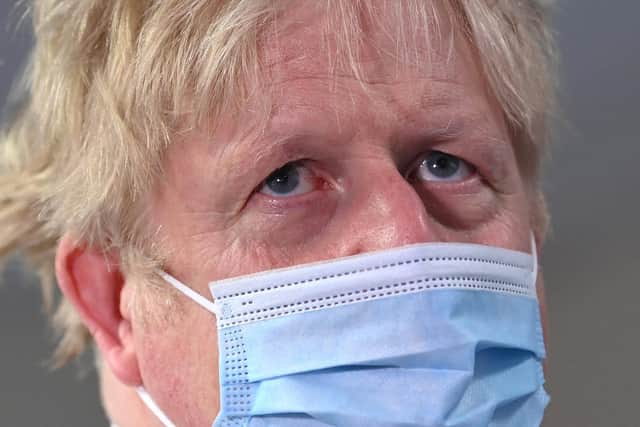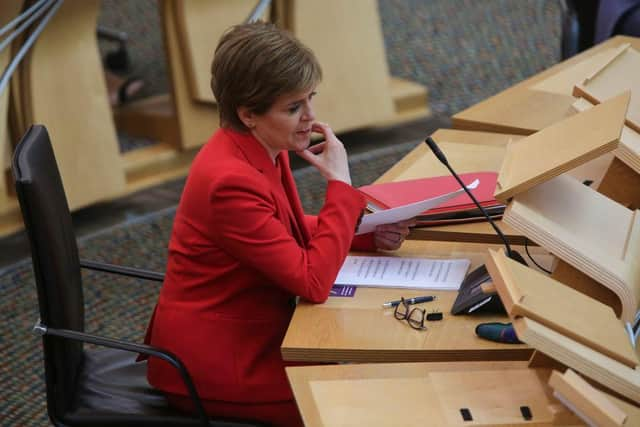Up to 30k deaths could have been saved if Covid lockdown was week earlier, says former adviser
Professor Neil Ferguson, whose modelling was instrumental in persuading the government to bring in the first lockdown, warned the planned further easing of lockdown restrictions next month “hangs in the balance”.
He echoed claims made 24 hours earlier by former No.10 adviser Dominic Cummings that tens of thousands of people died unnecessarily because of government failings as it was revealed confirmed cases of the Indian variant had doubled in a week to reach almost 7,000.
Advertisement
Hide AdAdvertisement
Hide AdThe virulent new strain, which is believed to be more transmissible, now represents up to three-quarters of new infections in the UK.
Another 3,542 new Covid cases were reported in the UK yesterday, the highest figure since the end of March, with the average number of infections about 20 per cent higher than last week.
Numbers of infections with the Indian variant have doubled over the past week from 3,424 to 6,959, although some of the rise could be explained by extra testing.
The alarming figures were outlined as health chiefs in Tayside raised concerns over a “significant increase” in coronavirus cases in Dundee, with the Indian variant spreading in the region.


The latest seven-day rate of case per 100,000 people in Dundee was 62.3, covering May 18 to 24.
Seven days earlier – a day after lockdown easing moved most of Scotland including Tayside to level two – this rate was 16.1.
NHS Tayside director of public health Dr Emma Fletcher said: “I am very concerned about the significant rise in the number of cases of the virus in Dundee over the last week.


“We expected a small increase in case numbers due to the easing of restrictions, but we now have the more infectious variant of the virus which was first identified in India circulating in Tayside and this is contributing to increasing infection rates.
Advertisement
Hide AdAdvertisement
Hide Ad“It is very important for every single one of us that we quickly get on top of this developing situation and slow down the spread of the virus, and we need everyone’s help to do this.
“We have done so well in Tayside, but it’s vital that we all act now and continue to work together to drive the number of new cases back down.”
Prof Ferguson, one of the architects of the first lockdown, said data collected in the next two to three weeks “will be critical” as he voiced concerns the UK Government had been slow to act last year.
The Imperial College expert told BBC Radio 4's Today programme: "Had we locked down a week earlier – I said at the time – we would have saved half the lives, that really equates too, it was much earlier in the pandemic, so it equates to 20,000 to 30,000 lives and I think that's unarguable.
"I mean the epidemic was doubling every three to four days in weeks 13th to 23rd of March, and so had we moved the interventions back a week we would have curtailed that and saved many lives."
Damning accusations that government inaction was to blame for thousands of needless Covid-19 deaths were denied by Boris Johnson as he fought off grave criticism heaped on him by former adviser Dominic Cummings.
The Prime Minster was forced to deny claims his unwillingness to take the pandemic seriously in early 2020 led to the country’s huge death toll, saying the government had not taken “incredibly difficult” decisions lightly.
In response to allegations the Government “sent” Covid-positive patients into care homes due to a lack of coherent strategy, Mr Johnson said deaths in these settings were “tragic”, but suggested it was caused by a lack of knowledge about coronavirus in the early stages of the pandemic.
Advertisement
Hide AdAdvertisement
Hide AdHe doubled down in his denial over claims he said he would rather see “bodies piled high” than enforce the second national lockdown in Autumn, saying “some of the commentary I’ve heard doesn’t bare any relation to reality”.
Asked if Mr Cummings was telling the truth when he gave evidence on Wednesday, Mr Johnson said: “I make no comment on that.”
Asked further about the spread of the Indian variant, the Prime Minister said: “I don’t see anything in the data to suggest that we have to deviate from the road map. But we may need to wait.”
Health secretary Matt Hancock told a Downing Street press conference the Indian strain was now dominant in Britain, representing up to 75 of new infections.
He said: "Latest estimates are that more than half and potentially three quarters of all new cases are of this variant."
Mr Hancock said the cases remained focused in hot-spot areas and disclosed that there were 49 confirmed patients currently in Bolton hospital, which is “functioning well”. Five of these patients had been vaccinated twice.
Glasgow has remained locked in level three restrictions while the city deals with comparatively high numbers of Covid cases, with the outbreak also having been linked to the Indian variant.
A total of 464 new Covid-19 cases were reported in Scotland in the 24 hours to yesterday, with no further deaths recorded.
Advertisement
Hide AdAdvertisement
Hide AdFirst Minister Nicola Sturgeon hailed a reduction in hospital cases of coronavirus and another small drop in the number of patients in ICU as “reasons to be optimistic”.
In the daily figures for Thursday, 83 people were in hospital, down 15 on the previous day, with four patients in intensive care, down from six.
Ms Sturgeon said the Scottish Government wanted to get Glasgow back on track “as quickly as possible, but that’s got to be done responsibly and safely”.
Her position came as she clashed with Scottish Conservative leader Douglas Ross at First Minister’s Questions over the support being offered to Glasgow businesses left “struggling to survive” by Covid-19 restrictions.
Mr Ross pointed to a warning from the Scottish Chambers of Commerce that more firms would go bust in the city unless they were given greater help from the Scottish Government.
Glasgow is the only part of Scotland still under level three restrictions.
The Scottish Conservative leader said Glasgow Chamber of Commerce chief executive Stuart Patrick warned 90 per cent of businesses in the city would receive less than they were promised by ministers.
Quoting the Chamber of Commerce, Mr Ross said: “The financial support offered bears no relationship to the economic damage being done by the restrictions.”
Advertisement
Hide AdAdvertisement
Hide AdBut Ms Sturgeon insisted there were a “range of different support streams” in place for businesses in Glasgow, which “will remain in place for as long as is necessary”.
She said: “I know how difficult it is for residents and businesses across Glasgow, but I also know how dangerous it would be if we eased restrictions too quickly and allowed a new variant of this virus, that we know is spreading perhaps even more quickly than the variant at the start of the year, to take a grip again.”
Ms Sturgeon insisted she understood the “frustration of the business community just as I understand the frustration of every single citizen across the country as we continue to grapple with a global pandemic,” but insisted that “good progress” was being made.
A message from the Editor:
Thank you for reading this article. We're more reliant on your support than ever as the shift in consumer habits brought about by coronavirus impacts our advertisers.
If you haven't already, please consider supporting our trusted, fact-checked journalism by taking out a digital subscription.
Comments
Want to join the conversation? Please or to comment on this article.
